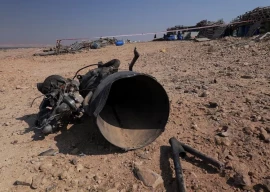
ISLAMABAD: Rural women residing in rural areas are the silent majority of the country — constituting around 70 per cent of the population — and serve as the backbone of society in the fields of health, agriculture, education, economy and administration.
Their efforts are instrumental in the development and progress of the country, yet they remain largely underrepresented and deprived of their legal rights, social security, and employment benefits.

The conference also features stalls of home-based rural women from different provinces. PHOTOS: MUHAMMAD JAVAID/EXPRESS
With the intervention of state, civil society organisations and local governments, it is time to change the status quo. This was the crux of a panel discussion on home-based workers’ rights, challenges and opportunities at the two-day seventh annual conference on rural women in Pakistan that began at Lok Virsa on Wednesday.
Potohar Organisation for Development Authority Executive Director Sameena Nazir said Malala Yousafzai participated in the conference in 2009 with the same passion and vigour that she exudes for campaigning for girls’ education now.
Nazir was joined by Lok Virsa Executive Director Shahera Shahid, PML-N MNA Tahira Aurangzeb and poet Kishwar Naheed as they addressed a massive gathering of rural women from across the country.
Naheed recited her poem ‘Sun ri saheli’ which celebrates the cultural diversity of women from across the country, celebrating their essence and harmony.

The conference also features stalls of home-based rural women from different provinces. PHOTOS: MUHAMMAD JAVAID/EXPRESS
The panel discussed pressures that women from underprivileged backgrounds face, including societal pressures, lack of facilities, opportunities and resources.
Organised by Bedari and supported by UN Women, the panel that chaired by Punjab Commission on the Status of Women head Fauzia Viqar, included UN Women Programme Coordinator Uzma Quresh, Bedari Board chairperson Irfan Mufti and Bedari President Hina Noreen.
Bedari Executive Director Arshad Mirza spoke about the denial of the rural home-based workers at the state and institution levels. “There is need for a systematic, pragmatic and coherent effort of the state, industry, business sector and civil society organisations to give due status to the rural home-based workers,” he said.
Quresh spoke about international women rights’ standards, underscoring relevant policymaking and laws in this regard. Among the provinces, she said, Sindh has accepted its agricultural workforce while other provinces need to lobby for the same.
Three rural home-based workers presented testimonies of their experiences of working tirelessly and being affected by the decline of exports in Sialkot. These women: Fizza, Saima and Huma shared the training for alternate skills that they acquired as part of Bedari’s training programmes.
A documentary, “A stitch in time”, depicted the challenges of women in Sialkot who hand-stitch soccer balls to be exported to the world. However, they have little incentive for the tedious work and strive to support their families with meager incomes.
Furthermore, the speakers called for policymaking and implementation of laws for the rural home-based workers. They also stressed for integrating the workers in industry, trade, policy-making processes and ensuring their fair wages.

Meanwhile, the conference also features stalls of home-based rural women from different provinces. Among these, Wazira Bibi, who belongs to Sindh, was preparing a fruit basket from palm tree leaves and Fatima Bibi from Balochistan was weaving hand-made carpets. Both of them have been equipped with skill-development training and machinery to enhance their productivity and finances.
Watch a slideshow of pictures here.
Published in The Express Tribune, October 16th, 2014.
















































COMMENTS
Comments are moderated and generally will be posted if they are on-topic and not abusive.
For more information, please see our Comments FAQ